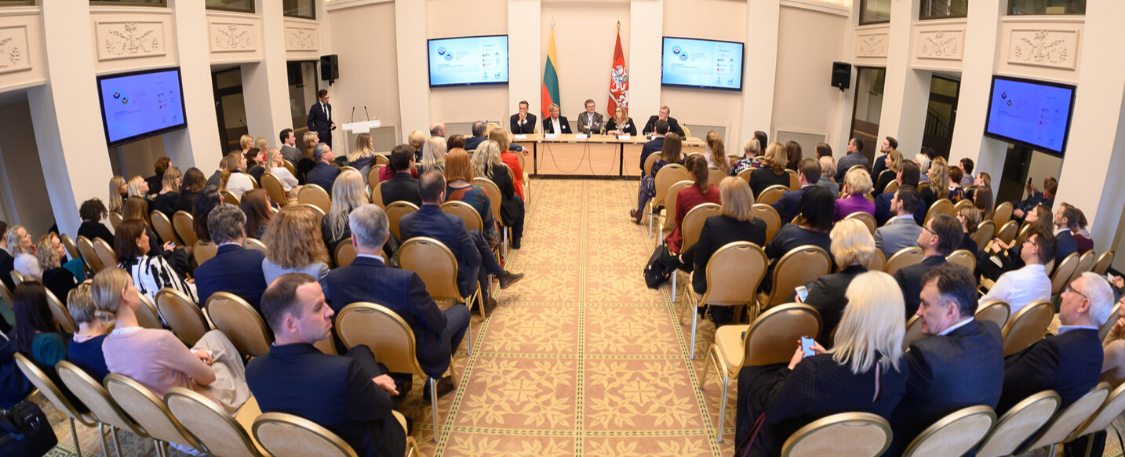Thank you to the 150+ delegates who attended this year’s Nordic – Baltic Sustainability Summit on 12th November!
The European Union’s readiness and transition to a circular economy is projected to create 580,000 new jobs, increase resource efficiency by 3% per year, and by 2030 will generate EUR 1.8 trillion to the EU economy and reduce its greenhouse gas emissions to 450 million tonnes.
The conference addressed the significant issue of sustainable solid waste management through the promotion of safe practices and effective technologies, also emphasizing the essence of collaboration for value creation in every part of the cycle in the shape of reduced climate impact and improved resource utilization.
The event brought together policymakers, professionals from research and education institutions, and a wide business community to share the most recent ideas, techniques and experiences in different areas of solid waste management, as well as to discuss challenges and how to boost circular solutions, in particular among SMEs.
The keynote speaker, Masamichi Kono, Deputy Secretary-General of the OECD (Organization for Economic Co-operation and Development), spoke in his opening statement about the eco-social challenges posed by climate change and the importance of a global approach for the circular economy. He called businesses to follow the OECD guidelines developing the circular economy and to cooperate with the international community in sharing good practices.
Finn Mortensen, Head of the Danish public and private equity organisation “State of Green”, highlighted the lack of national leadership in the circular economy globally and across Europe, and called for more cooperation to promote new business models. Danish company Novo Nordisk A/S shared an impressive industrial symbiosis model in the municipality of Kalundborg, where businesses from several different sectors have merged into a circular economy model.
Other business representatives from Lithuania, Denmark, Norway emphasized the importance of financial incentives and favorable regulatory conditions, as without adequate support businesses will hardly take significant action, and they are clearly in need of that when it comes to a fundamental shift from a linear economy to take-produce-throw model.
“The circular economy is a business opportunity, not a problem. It is a mindset that can help to address the already existing problems of over-consumption of natural resources and waste generation. The secondary market has great value and in liner production this value is not absorbed. Currently, the European Commission is systematizing the regulation of the circular economy through the creation of a sustainable financial system so that sustainable investment promotes the highest efficiency of the circular economy and the development of innovative business models, ”says Valda Chošnau, Sustainable Business Expert.
The first part of the conference focused on the state-business cooperation with speakers from foreign and Lithuanian institutions: Masamichi Kono, Deputy Secretary-General of the OECD; Finn Mortensen, Head of the Danish organisation “State and Green”; Agnė Bagočiūtė, Head of Waste Policy Group; Deputy Minister of Economy and Innovation Gintaras Vilda; expert of the Lithuanian National Coordination Center Audronė Alijošiutė-Paulauskienė and others.
In the second panel, business representatives from Denmark, Niels Peter Pretzmann, and Einar Runar Vinningland from Norway, also the European Crop Protection Association, as well as Kęstutis Jusčius from the Auga Group and Valda Chošnau, Sustainable Business Expert from the Lithuanian Responsible Business Association, shared business insights and challenges.
Speakers list is available on the agenda here.
Norwegian – Lithuanian Chamber of Commerce would like to thank all co-partners: Nordic Council of Ministers Office in Lithuania, Embassy of Denmark in Lithuania, Responsible Business Association of Lithuania (LAVA), Danish Chamber of Commerce in Lithuania, Swedish Chamber of Commerce in Lithuania, Finnish-Lithuanian Chamber of Commerce, Ministry of Foreign Affairs of the Republic of Lithuania, Ministry of Economy and Innovation, and Lithuanian National Contact Point.
Photo credit to Rytis Šeškaitis










































































